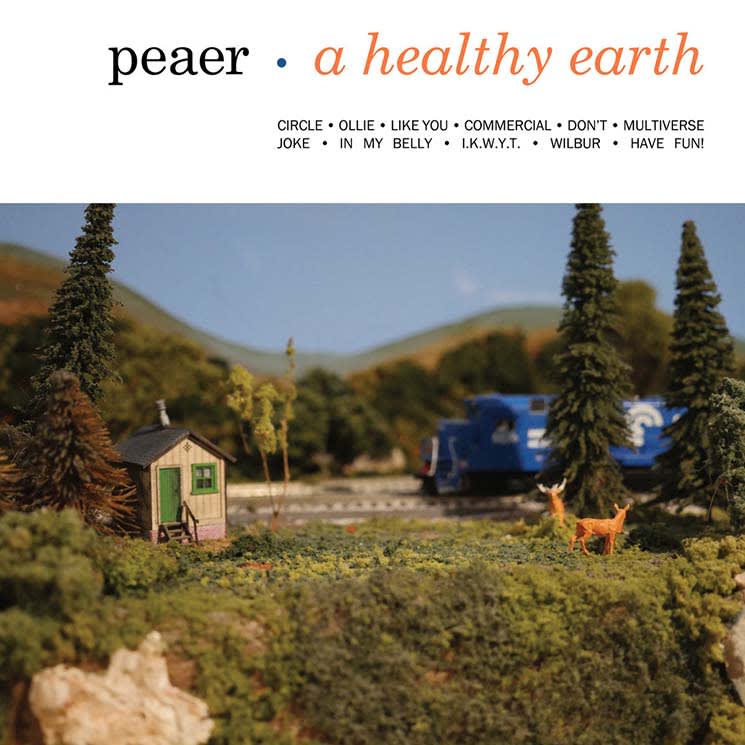It takes a certain mix of humour, aspiration and cynicism to name an album A Healthy Earth in the grips of humanity's existential threat of climate change. But the new record from Peaer is not a quest for environmental recovery voiced by David Attenborough, but more of a philosophical audit of modern life and our shared existence.
On an album of knotty, prickly yet nonchalant indie rock, Brooklyn artist Peter Katz and his newly solidified trio question what exactly makes love work, what makes our world the way it is and what it would be like if things went very differently.
A Healthy Earth is an academically imaginative pursuit that's based on the concept of tone painting — in other words, sonically constructing a song to reflect its lyrical subject. "Circle," for example, uses a circle-of-fifths chord progression that ends up sounding like an indie rock version of free jazz. "Ollie" is about Katz's dog, so it has a bass clarinet solo meant to capture the energy of a frolicking puppy. "Multiverse" is mixed and layered in a way that's meant to represent the theory of parallel universes.
That's all pretty neat, but it's also likely to go over a lot of heads. So what do we have here? Interestingly, for all the philosophy and methodology that went into it, A Healthy Earth comes out sounding very casual and spontaneous (even meandering at times). The songs are melodically inclined, but with an embrace of dissonance and shifting phrases that break up and are brought back together again. Even the more straightforward ones (like standouts "Don't" and "In My Belly") are so damp and muted that they're held back from the pleasures of conventional pop.
A Healthy Earth is colourful, but with a palette of muted pastels. There are shades of American Football, the Microphones, the Early November, Algernon Cadwallader, Sorority Noise and, as ever, Pavement. In purpose and practice, it's a more fully realized album than Peaer's self-titled effort from 2016. It starts out twisting and turning, which can feel like an adventure wondering where they're going next, but it also leaves it feeling aimless and unsure of itself.
The record gets better as it goes along, though, its direction and purpose crystallizing on the way. For all its lackadaisical vibe, A Healthy Earth is ripe with ideas and surprisingly captivating.
(Tiny Engines)On an album of knotty, prickly yet nonchalant indie rock, Brooklyn artist Peter Katz and his newly solidified trio question what exactly makes love work, what makes our world the way it is and what it would be like if things went very differently.
A Healthy Earth is an academically imaginative pursuit that's based on the concept of tone painting — in other words, sonically constructing a song to reflect its lyrical subject. "Circle," for example, uses a circle-of-fifths chord progression that ends up sounding like an indie rock version of free jazz. "Ollie" is about Katz's dog, so it has a bass clarinet solo meant to capture the energy of a frolicking puppy. "Multiverse" is mixed and layered in a way that's meant to represent the theory of parallel universes.
That's all pretty neat, but it's also likely to go over a lot of heads. So what do we have here? Interestingly, for all the philosophy and methodology that went into it, A Healthy Earth comes out sounding very casual and spontaneous (even meandering at times). The songs are melodically inclined, but with an embrace of dissonance and shifting phrases that break up and are brought back together again. Even the more straightforward ones (like standouts "Don't" and "In My Belly") are so damp and muted that they're held back from the pleasures of conventional pop.
A Healthy Earth is colourful, but with a palette of muted pastels. There are shades of American Football, the Microphones, the Early November, Algernon Cadwallader, Sorority Noise and, as ever, Pavement. In purpose and practice, it's a more fully realized album than Peaer's self-titled effort from 2016. It starts out twisting and turning, which can feel like an adventure wondering where they're going next, but it also leaves it feeling aimless and unsure of itself.
The record gets better as it goes along, though, its direction and purpose crystallizing on the way. For all its lackadaisical vibe, A Healthy Earth is ripe with ideas and surprisingly captivating.




